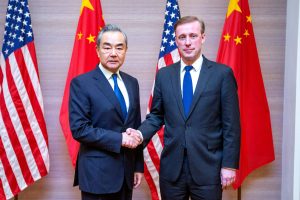On January 26 and 27, the head of the Chinese Communist Party’s Central Commission for Foreign Affairs, Wang Yi, met with U.S. National Security Advisor Jake Sullivan in Bangkok, Thailand. (Wang is also the foreign minister, but was identified in the official readout using his other, higher-ranking title, as that office is considered to counterpart of the U.S. national security advisor post.)
According to China’s Foreign Ministry, Wang and Sullivan “had candid, substantive and productive strategic communication on implementing the common understandings reached between the two heads of state at the summit meeting in San Francisco.” Similarly, the White House described the meeting as meant “to follow up on the Woodside Summit between President Biden and President Xi last November.”
A senior Biden administration official told reporters that the discussions between Wang and Sullivan lasted “over 12 hours over two days.” It was the fourth meeting between the two men since Wang assumed his post as director of the Central Commission for Foreign Affairs.
“This quite low-profile channel between the National Security Advisor and Director Wang is an important way to manage competition and tensions responsibly,” the senior official said. “The two-day format of these meetings… allows us to dive deeply into substance and have a strategic, thoughtful conversation about the direction of the relationship and key issues both countries face.”
From China’s point of view, Taiwan tops the list of those “key issues.” The Democratic Progressive Party – which Beijing views as a party of separatists advocating for an independent Taiwan – just won an unprecedented third term in office. China was especially displeased that a delegation of former U.S. officials visited Taipei immediately after the election. Wang stressed to Sullivan that “‘Taiwan independence’ poses the biggest risk to cross-strait peace and stability and the biggest challenge to China-U.S. relations.”
It’s notable that in the Chinese readout, Taiwan is the first issue mentioned; in the U.S. readout it’s the last, trailing behind “global and regional issues, including those related to Russia’s war against Ukraine, the Middle East, DPRK [North Korea], the South China Sea, and Burma [Myanmar].”
Another of Beijing’s top concerns is the Biden administration’s heavy restrictions on China’s high-tech industry, which are openly meant to curtail progress in key fields such as semiconductors and artificial intelligence (AI). “There should be no politicizing or overstretching of the concept of security, nor can these concerns be used to suppress and contain other countries’ development,” Wang insisted. China’s readout added, “The two sides agreed to further discuss the boundary between national security and economic activities.”
Compared to the Chinese summary, the U.S. version was remarkably upbeat. There was no specific mention of problems in the official readout. In the longer press briefing, the senior administration official did note that “Sullivan underscored continued concern with the PRC’s unfair trade policies, non-market economic practices, and retaliatory actions against U.S. firms,” as well as “other specific issues in the bilateral relationship where we have differences.” But these didn’t make it into the top-line summary, which instead focused on the progress being made.
Indeed, Wang and Sullivan discussed implementing some of the promises made at the Biden-Xi summit last November. The promised working group on counternarcotics cooperation was given a start date of January 30, for example. The previously announced platform for talks on artificial intelligence was given a more nebulous start date of sometime “this spring.”
The two sides also promised to continue “regular contact” between Biden and Xi, including a future phone call between the two at “some point in the coming months.” And China and the United States will continue “a series of dialogue and consultation mechanisms in such areas as diplomacy, military, economy, finance, business and climate change.”
In other words, Beijing and Washington plan to continue the rapid clip of diplomatic exchanges that began with Secretary of State Antony Blinken’s visit to China last June. The Biden administration’s push to put “guard rails” in place is finally progressing, even if the two governments aren’t actually resolving any of the main issues in their relationship.
In fact, the senior Biden administration official even made a point of underscoring that “these channels of communication do not indicate a change in approach” on China – likely an attempt to fend off domestic criticism that Biden is “soft on China” before his re-election bid later this year.
On that note, it stands out that the most tangible progress has come on important U.S. priorities: restarting military communication channels and broadening cooperation on counternarcotics. While such cooperation arguably also benefits Beijing, Washington has generally been more invested in these dialogues, and China has often used them as political leverage. Meanwhile, the Biden administration remains unwilling to budge on China’s top priorities, including U.S. support for Taiwan and restrictions on China’s high-tech industry.
Now the question is how long that dynamic remains palatable for Beijing – which also faces criticisms from nationalists at home for being “soft” on the United States.
































